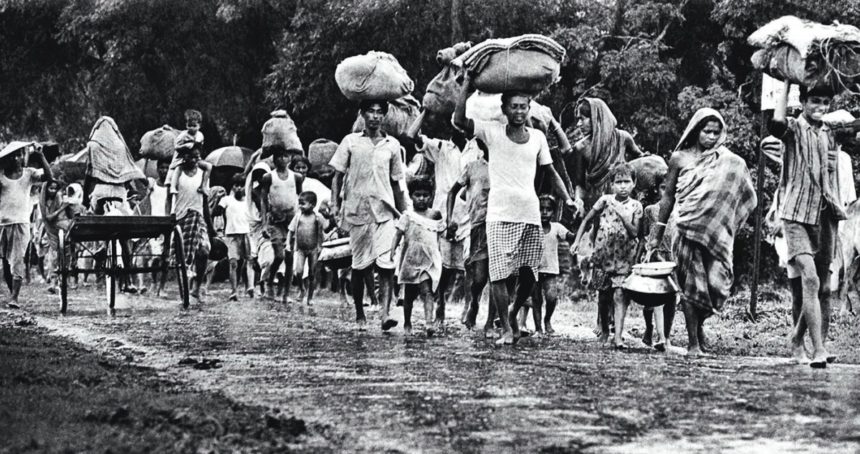The Hindu Bengali genocide which coincides with World Refugee Day is a blot on humanity that still isn't acknowledged for its barbarity.
Not so strange a coincidence

Both West Bengal Day and World Refugee Day are on 20 June
Late in March 2020, with the beginning of the lockdown, hundreds of migrant labourers began to walk back home from the big cities to their hometowns along the national highways. Forty-nine springs ago, the world witnessed a similar scene in East Pakistan, where thousands of Bengali Hindus were walking along the Jessore Road towards the Indian border. It was late March 1971, the Pakistan Army had launched Operation Searchlight. The genocide of the Bengali Hindus had begun. Thankfully, the refugees had a place on earth, where they won’t be unwelcome. The piece of land called West Bengal was not just another by-product of colonial whims, it was the result of a nationalist movement that is almost forgotten today.
The Great Calcutta Killing and the Noakhali Genocide in 1946, convinced the Bengali Hindu leadership that the existence of the Bengali Hindu people is at stake under the Muslim League government in Bengal. With the British departure imminent, the Bengali Hindu intellectuals rallied around Syama Prasad Mookerjee to demand the partition of Bengal and creation of West Bengal as a homeland of the Bengali Hindu people, irrespective of whether India is partitioned or not. Months of intense campaign, representations and lobbying finally convinced the Congress high command and eventually the British administration to consider Bengal as a candidate for partition, along with the Partition of India.
On 3rd June, Viceroy Mountbatten laid down his partition plan, in accordance with which the Bengal Legislative Assembly sat on the 20th June to decide the future of Bengal. The legislators from the non-Muslim majority districts of western Bengal voted 58-21 in favour of joining the existing Constituent Assembly of the Indian Union. The interim government of West Bengal was formed with a ten-member cabinet taking oath on 3rd July, 43 days before the British departure from the sub-continent.
While the territorial adjustments took weeks, months and years to finalise, the birthday of West Bengal is undoubtedly 20th June 1947, now commemorated as West Bengal Foundation Day or simply West Bengal Day. West Bengal was founded as the homeland of the Bengali Hindu people, where the refugees from East Pakistan had the right to come and settle. That Syama Prasad Mookerjee’s campaign for the creation of Bengali Hindu homeland was indeed a visionary movement, was vindicated by the serial anti-Bengali Hindu pogroms in Pakistan that finally climaxed in the genocide of 1971, leading to millions of Bengali Hindu refugees settling in West Bengal.
Coincidentally 20th June is also the World Refugee Day. The roots of this UN commemorative day traces back to post-colonial Rwanda of the late 1950s when the majority Hutus captured political power through the Rwandan Revolution and drove large sections of the culturally advanced Tutsi minority out of the country to Uganda. The Tutsi leadership in exile formed the Rwandan Patriotic Front and invaded Rwanda in the early 1990s to dispose of the xenophobic Hutu leadership from the power that precipitated the Rwandan Civil War. In 1994, following the assassination of President Habariyamana who was an ethnic Hutu, the Hutu extremist militias driven by the Hutu Power ideology massacred an estimated eight million Tutsis, Twa and moderate Hutus, which came to be known as the Rwandan genocide.
Paul Kagame led the Rwandan Patriotic Front to victory in the civil war and put an end to the genocide. In the aftermath of the war, the RPF formed the government with a Hutu President and Paul Kagame as Vice President and the Defence Minister. The military arm of the RPF was transformed into the national army. Kagame being the Commander-in-Chief, he was the de facto leader of Rwanda. On 20th June 1996, Kagame in a speech marked the day as African Refugee Day. Since then, African countries affected by the Rwandan genocide and the subsequent First Congo War started commemorating the day as African Refugee Day. On 4th December 2000, the United Nations passed a resolution to observe 20th June as World Refugee Day from 2001, in commemoration of 50th anniversary of the UN Refugee Convention 1951.
The similarity between the Bengali Hindus and the Tutsis are many. Both were culturally and economically advanced minorities in their native land, surrounded by a majority community whose xenophobic political leadership in their hunger for power viewed the minority community as the obstacle in grabbing power. Both were subjected to massacres and ethnic cleansing and forced to become refugees. Both were subjected to the vilest of ethnic slurs – Malaun and Inyenzi. Both were victims of genocide – the two of the most gruesome genocides of the 20th century, characterized by hatred, bestiality, rape and speed by the Razakars, Peace Committee and other collaborators.
Both the communities had a visionary leader among themselves, who could lead their community out of extinction and give them a fresh lease of life. While Mookerjee as a visionary statesman saved the West Bengal for the Bengali Hindus before the ultimate disaster could happen, Kagame is the national hero of Rwanda who lived through the ultimate disaster and saved the Tutsis from extinction.
Strange coincidence it may seem that both the commemorative days fall on 20th June, but it may not be that strange at all. Human history has such examples, a very recent being that of 9th November 1989, that saw the demolition of the Berlin Wall and the foundation stone laying of Ram Temple in Ayodhya. While one monument of injustice was being demolished in one free nation, another monument of justice was being erected in another free nation. If there is any divine providence in the existence and progress of humanity this is it. Commemoration of the World Refugee Day half a century after the West Bengal Day is nothing but the manifestation of the same.

Leave a Reply